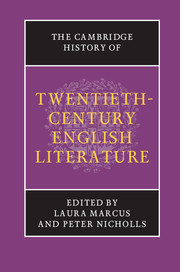Book contents
- Frontmatter
- Introduction
- PART ONE WRITING MODERNITY
- PART TWO THE EMERGING AVANT-GARDE
- PART THREE MODERNISM AND ITS AFTERMATH, 1918–1945
- 10 Trauma and war memory
- 11 The time–mind of the twenties
- 12 Modern life: fiction and satire
- 13 Modernist poetry and poetics
- 14 Modernity and myth
- 15 Psychoanalysis and literature
- 16 Biography and autobiography
- 17 ‘Speed, violence, women, America’: popular fictions
- 18 Theatre and drama between the wars
- 19 Literature and cinema
- 20 The thirties: politics, authority, perspective
- 21 Literary criticism and cultural politics
- 22 Surrealism in England
- 23 World War II: contested Europe
- 24 World War II: the city in ruins
- PART FOUR POST-WAR CULTURES, 1945–1970
- PART FIVE TOWARDS THE MILLENNIUM, 1970–2000
- Bibliography
- Index
- References
10 - Trauma and war memory
from PART THREE - MODERNISM AND ITS AFTERMATH, 1918–1945
Published online by Cambridge University Press: 28 March 2008
- Frontmatter
- Introduction
- PART ONE WRITING MODERNITY
- PART TWO THE EMERGING AVANT-GARDE
- PART THREE MODERNISM AND ITS AFTERMATH, 1918–1945
- 10 Trauma and war memory
- 11 The time–mind of the twenties
- 12 Modern life: fiction and satire
- 13 Modernist poetry and poetics
- 14 Modernity and myth
- 15 Psychoanalysis and literature
- 16 Biography and autobiography
- 17 ‘Speed, violence, women, America’: popular fictions
- 18 Theatre and drama between the wars
- 19 Literature and cinema
- 20 The thirties: politics, authority, perspective
- 21 Literary criticism and cultural politics
- 22 Surrealism in England
- 23 World War II: contested Europe
- 24 World War II: the city in ruins
- PART FOUR POST-WAR CULTURES, 1945–1970
- PART FIVE TOWARDS THE MILLENNIUM, 1970–2000
- Bibliography
- Index
- References
Summary
‘We should have done well, I think, to be satisfied with the aspect of peace’, Virginia Woolf wrote from Richmond on 12 November 1918, describing the grey, wet day that met the armistice of World War I with weary solemnity. Arriving in London, however, the euphoria of the loud and drunken crowds carousing in the rain struck her as nervy and strained. ‘There was no centre, no form for all this wandering emotion to take’, she noted, ‘in everyone’s mind the same restlessness and inability to settle down, & yet discontent with whatever it was possible to do.’ For those who had survived the conflict, jubilation would quickly give way to a growing sense of dislocation and indeterminacy. The confident Edwardian world that had approached war in 1914 had by now dissolved into myth, and, surveying its ruins, modern society faced a crisis of belief and identity.
The disintegration of nineteenth-century assumptions of progress, order and the stability of self and nationhood had, of course, been heralded well before. In the years immediately prior to the conflict, the avant-garde movements of Futurism, Imagism and Vorticism were vociferous in proclaiming their determined dissociation from the past, condemning the enervating effect of bourgeois tradition and rejecting historical consciousness for the immediacy of the modern. Recalling the creative energy of the London literary scene of the time in his memoir Return to Yesterday, for example, Ford Madox Ford depicts the young artist ‘D.Z.’ (a caricature of Wyndham Lewis), exultingly announcing to the older writer: ‘Finished! Exploded! Done for! Blasted in fact.’
- Type
- Chapter
- Information
- The Cambridge History of Twentieth-Century English Literature , pp. 173 - 196Publisher: Cambridge University PressPrint publication year: 2005
References
- 1
- Cited by

